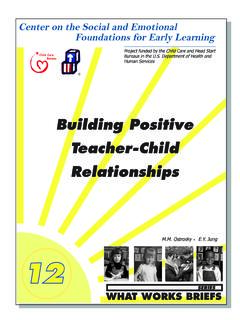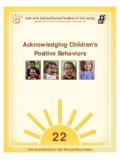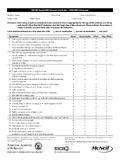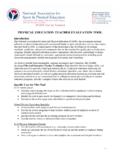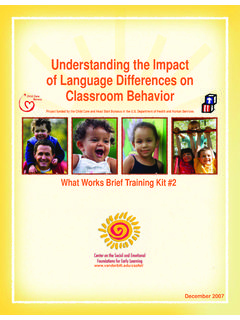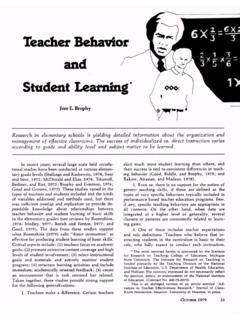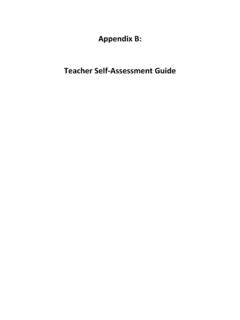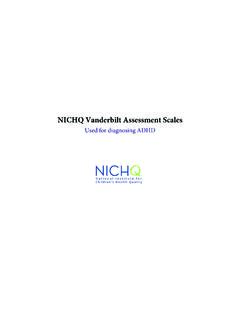Teacher Behavior
Found 10 free book(s)Building Positive Teacher-Child Relationships
challengingbehavior.cbcs.usf.eduThe development of toddlers’ responses to affectionate teacher behavior. Early Childhood Research Quarterly , 12 (1), 99-116. This What Works Brief was developed by the Center on the Social and Emotional Foundations for Early Learning.
Tip Sheet: Functional Behavior Assessment and Function ...
my.vanderbilt.eduproblem behavior than interventions that are designed simply to reduce inappropriate behavior. Instead of focusing on just the definition of a behavior, focus on why a behavior is occurring. Possible function of behavior: To get access to something o Social attention (teacher, parent, peer) o Tangible (object, activity, event)
Acknowledging Children’s Positive Behaviors
csefel.vanderbilt.eduJul 22, 2007 · again as the teacher shouts, “Don’t make me come over there; you know not to leave the classroom!” That kind of attention will reinforce and increase that behavior. † Although a specific child behavior may be temporarily weakened by a negative response from the adult, there is no assurance that a more desirable behavior is being
NICHQ Vanderbilt Assessment Scale—TEACHER Informant
www.jeffersandmann.comand should reflect that child’s behavior since the beginning of the school year. Please indicate the number of weeks or months you have been able to evaluate the behaviors: _____. Is this evaluation based on a time when the child was on medication was not on medication not sure? Symptoms Never Occasionally Often Very Often 1.
PHYSICAL EDUCATION TEACHER EVALUATION TOOL
www.michigan.gov5: Exhibits responsible personal and social behavior that respects self and others in physical activity settings. 6: Values physical activity for health, enjoyment, challenge, self-expression, and/or social interaction. Prior to observing a physical education class/teacher, NASPE requests that you review its online guidelines,
Understanding the Impact of Language Differences on ...
csefel.vanderbilt.edudo, but Janelle often looks at her teacher blankly and does not respond to Ms. Corinne’s questions or follow her directions. Ms. Corinne is becoming ... • Ask the child’s parents about behavior as well as the child’s other abilities (cognitive, social emotional, and physical).
Teacher Behavior - ASCD
www.ascd.orgTeacher Behavior and Student Learning Jere E. Brophy Research in elementary schools is yielding detailed information about the organization and management of effective classrooms. The success of individualized vs. direct instruction varies according to grade and ability level and subject matter to …
Appendix B: Teacher Self-Assessment Guide
usny.nysed.govThe Thoughtful Classroom Teacher Effectiveness Fram ework TABLE OF CONTENTS FOR TEACHER SELF-ASSESSMENT GUIDE Overview & Where This Model Comes From 1 This section provides teachers with an overview of how The Thoughtful Classroom Teacher Effectiveness Framework is organized and its foundation in current research.
Behavior IEP Goals - A Day In Our Shoes
adayinourshoes.comindependent of teacher support, with teacher support as measured by _____ (teacher observation, checklist, anecdotal records, behavior checklist, self evaluation, etc.). Objective #1 Identify situations that may lead to conflict (e.g.. hurtful teasing. name calling). Objective #2 Respond appropriately to peer pressure.
NICHQ Vanderbilt Assessment Scale—PARENT Informant
www.nichq.organd should reflect that child’s behavior since the beginning of the school year. Please indicate the number of weeks or months you have been able to evaluate the behaviors: _____. Is this evaluation based on a time when the child was on medication was not on medication not sure? Symptoms Never Occasionally Often Very Often 1.
